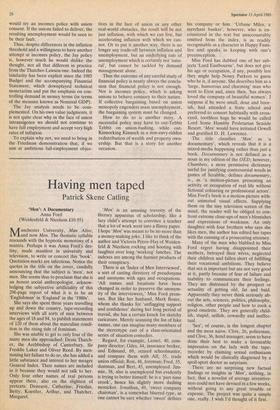Having men taped
Patrick Skene Catling
'Men': A Documentary Anna Ford (Weidenfeld & Nicolson £10.95)
Manchester University, Man Alive, and now Men. The thematic syllable resounds with the hypnotic monotony of a mantra. Perhaps it was Anna Ford's des- tiny, made manifest in university and television, to write or concoct this 'book'. Quotation marks are infectious. Notice the quotes in the title on the cover, candidly announcing that the subject is 'men', not men. She seems thus to proclaim that she is an honest social anthropologist, acknow- ledging the subjective artificiality of this 296-page report of what it is to be an 'Englishman' in 'England' in the '1980s'.
She says she spent three years travelling up and down the country, tape-recording interviews with all sorts of men between the ages of 18 and 94, to publish statements of 120 of them about the masculine condi- tion in the rising tide of feminism.
She was unable to get to only four of the many men she approached: Denis Thatch- er, the Archbishop of Canterbury, Sir Freddie Laker and Oliver Reed. By men- tioning her failure to do so, she has added a little substance and interest to her meagre General Index. Their names are included in it because they would not talk to her. Only four other names of real persons appear there, also on the slightest of pretexts: Deneuve, Catherine; -Friedan, Betty; Koestler, Arthur, and Thatcher, Margaret. 'Men' is an amusing travesty of the literary apparatus of scholarship, like .a lazy child's attempt to convince a teacher that a lot of work went into a flimsy paper. I hope 'Men' was meant to be no more than a money-making joke. I like to think of the author and Victoria Petrie-Hay of Weiden- feld & Nicolson rocking and hooting with laughter over long 'working' lunches. The indexes are among the funnier products of their conspiracy.
There is an 'Index of Men Interviewed', a sort of casting directory of pseudonyms and anonyms with ages and occupations. 'All names and locations have been changed in order to preserve the anonym- ity of the interviewees,' Miss Ford prom- ises. But like her husband, Mark Boxer, whom she thanks for 'unflagging support and confidence' during her long period of travail, she has a certain knack for sketchy caricature. Merely scanning the list of fake names, one can imagine many members of the stereotype cast of a class-orientated series of situation-comedies.
Regard, for example, Lionel, 40, com- pany director; Giles, 44, insurance broker, and Edmund, 69, retired schoolmaster, and compare them with Alf, 55, trade union official; Ron, 48, foreman; Fred, 55, dustman, and Bert, 45, unemployed. Jim- mie, 38, also is unemployed but evidently is trying to better himself: he is a 'part-time crook', hence his slightly more dashing monicker. Jonathan, 49, 'sweet company chairman', is a somewhat blurred type, as one cannot be sure whether 'sweet' defines his company or him. 'Urbane Miles, a merchant banker', however, who is en- countered in the text but unaccountably omitted from the index, is as readily recognisable as a character in Happy Fami- lies and speaks in keeping with one's preconception.
Miss Ford has dubbed one of her sub- jects 'Lord Eastbourne', but does not give his age or occupation, if any, possibly lest they might help Nosey Parkers to guess who he is, if anyone. She describes him as a 'large, humorous and charming' man who went to Eton and, since then, 'has always loved the company of beautiful women'. I suppose if he were small, dour and boor- ish, had attended a State school and preferred to consort habitually with cross- eyed, toothless hags he would be called Lord Some Humbly Proletarian Seaside Resort. 'Men' would have irritated Orwell and gratified D. H. Lawrence.
The title classifies 'Men' as 'a documentary', which reveals that it is a mixed-media happening rather than just a book. Documentary is not defined as a noun in my edition of the OED; however, Chambers, a more permissive dictionary useful for justifying controversial words in games of Scrabble, defines documentary, n., as 'a motion-picture presenting an activity or occupation of real life without fictional colouring or professional actors'. Miss Ford's book is a motion-picture with- out animated visual effects. Supplying them on the tiny television screen of the mind, the reader will be obliged to con- front extreme close-ups of men's blemishes and expressions of weakness. An only daughter with four brothers who says she likes men, the author has edited her tapes with the cunning of a prosecuting attorney.
Many of the men who blabbed to Miss Ford regret having disappointed their mothers, betrayed their wives, neglected their children and fallen short of fulfilling their vocational ambitions. They believe that sex is important but are not very good at it, partly because of fear of failure and inability to communicate their feelings. They are distressed by the prospect or actuality of getting old, fat and bald. Apparently they never think seriously ab- out the arts, sciences, politics, philosophy, religion, other people and how to cook a good omelette. They are generally child- ish, stupid, selfish, cowardly and ineffec- tual.
'Sex', of course, is the longest chapter and the most naive. Clive, 26, policeman, and Clive, 36, hotel manager, seem to have done their best to make a favourable impression on the lady with the tape- recorder by claiming sexual enthusiasm which would be clinically diagnosed by a spoil-sport doctor as satyriasis.
There are no surprising new factual findings or insights in 'Men', nothing, in fact, that a novelist of average inventive- ness could not have devised in a few weeks, without going to any great trouble or expense. The project was quite a simple one, really. I wish I'd thought of it first.














































 Previous page
Previous page